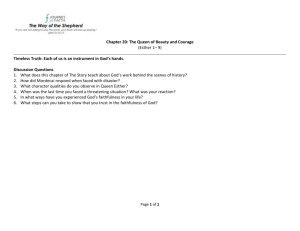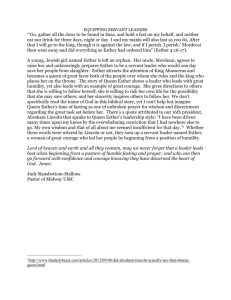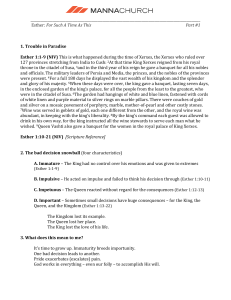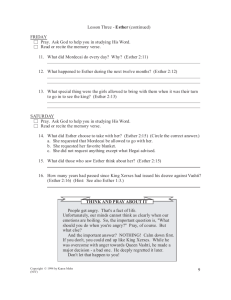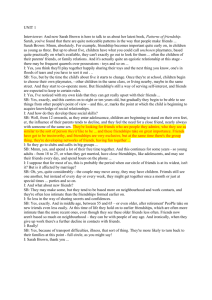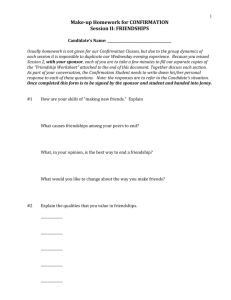Let's Talk Authored by Dan Roselle Communication is an integral
advertisement
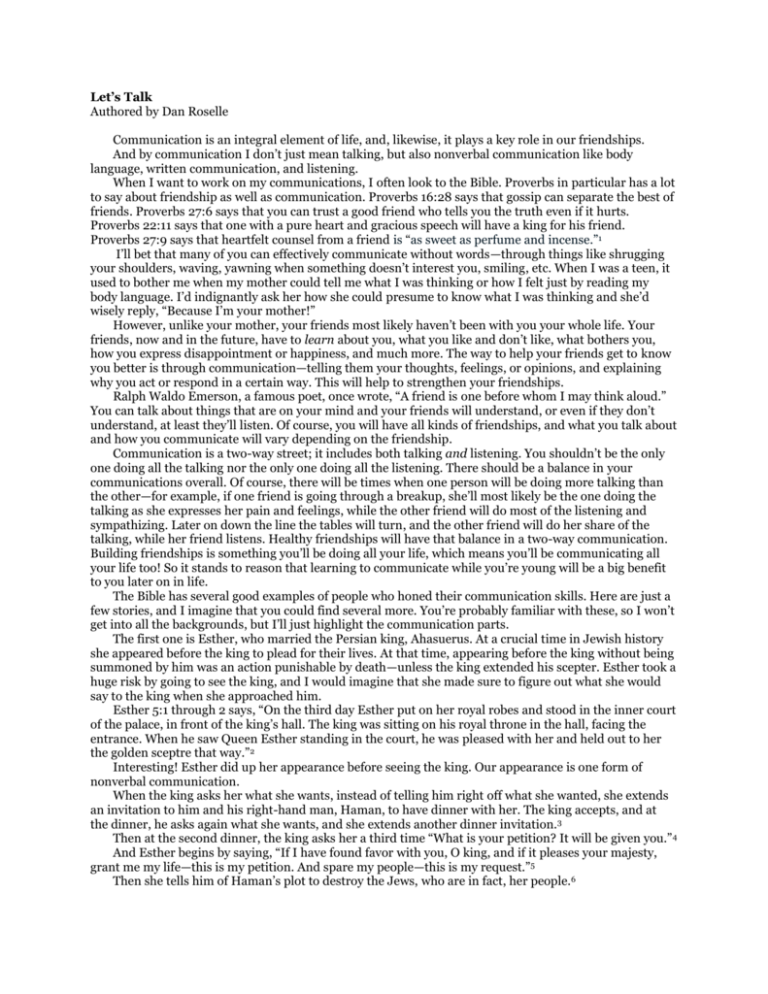
Let’s Talk Authored by Dan Roselle Communication is an integral element of life, and, likewise, it plays a key role in our friendships. And by communication I don’t just mean talking, but also nonverbal communication like body language, written communication, and listening. When I want to work on my communications, I often look to the Bible. Proverbs in particular has a lot to say about friendship as well as communication. Proverbs 16:28 says that gossip can separate the best of friends. Proverbs 27:6 says that you can trust a good friend who tells you the truth even if it hurts. Proverbs 22:11 says that one with a pure heart and gracious speech will have a king for his friend. Proverbs 27:9 says that heartfelt counsel from a friend is “as sweet as perfume and incense.”1 I’ll bet that many of you can effectively communicate without words—through things like shrugging your shoulders, waving, yawning when something doesn’t interest you, smiling, etc. When I was a teen, it used to bother me when my mother could tell me what I was thinking or how I felt just by reading my body language. I’d indignantly ask her how she could presume to know what I was thinking and she’d wisely reply, “Because I’m your mother!” However, unlike your mother, your friends most likely haven’t been with you your whole life. Your friends, now and in the future, have to learn about you, what you like and don’t like, what bothers you, how you express disappointment or happiness, and much more. The way to help your friends get to know you better is through communication—telling them your thoughts, feelings, or opinions, and explaining why you act or respond in a certain way. This will help to strengthen your friendships. Ralph Waldo Emerson, a famous poet, once wrote, “A friend is one before whom I may think aloud.” You can talk about things that are on your mind and your friends will understand, or even if they don’t understand, at least they’ll listen. Of course, you will have all kinds of friendships, and what you talk about and how you communicate will vary depending on the friendship. Communication is a two-way street; it includes both talking and listening. You shouldn’t be the only one doing all the talking nor the only one doing all the listening. There should be a balance in your communications overall. Of course, there will be times when one person will be doing more talking than the other—for example, if one friend is going through a breakup, she’ll most likely be the one doing the talking as she expresses her pain and feelings, while the other friend will do most of the listening and sympathizing. Later on down the line the tables will turn, and the other friend will do her share of the talking, while her friend listens. Healthy friendships will have that balance in a two-way communication. Building friendships is something you’ll be doing all your life, which means you’ll be communicating all your life too! So it stands to reason that learning to communicate while you’re young will be a big benefit to you later on in life. The Bible has several good examples of people who honed their communication skills. Here are just a few stories, and I imagine that you could find several more. You’re probably familiar with these, so I won’t get into all the backgrounds, but I’ll just highlight the communication parts. The first one is Esther, who married the Persian king, Ahasuerus. At a crucial time in Jewish history she appeared before the king to plead for their lives. At that time, appearing before the king without being summoned by him was an action punishable by death—unless the king extended his scepter. Esther took a huge risk by going to see the king, and I would imagine that she made sure to figure out what she would say to the king when she approached him. Esther 5:1 through 2 says, “On the third day Esther put on her royal robes and stood in the inner court of the palace, in front of the king’s hall. The king was sitting on his royal throne in the hall, facing the entrance. When he saw Queen Esther standing in the court, he was pleased with her and held out to her the golden sceptre that way.”2 Interesting! Esther did up her appearance before seeing the king. Our appearance is one form of nonverbal communication. When the king asks her what she wants, instead of telling him right off what she wanted, she extends an invitation to him and his right-hand man, Haman, to have dinner with her. The king accepts, and at the dinner, he asks again what she wants, and she extends another dinner invitation.3 Then at the second dinner, the king asks her a third time “What is your petition? It will be given you.” 4 And Esther begins by saying, “If I have found favor with you, O king, and if it pleases your majesty, grant me my life—this is my petition. And spare my people—this is my request.”5 Then she tells him of Haman’s plot to destroy the Jews, who are in fact, her people.6 It sounds to me like Esther had a lot of tact in how she went about bringing up a delicate issue. She paid attention to her appearance and made sure that how she looked would convey a welcoming message to the king. She didn’t jump right into addressing a sensitive subject, but started off with a warm invitation to dinner. And just before bringing up her real request, she put herself in a humble light, requesting favor and the saving of her life. Esther was a successful communicator. Another successful communicator was Joseph, the son of Jacob, whose story can be found in Genesis 37 to 45. Now, Joseph wasn’t always a good communicator. As a young man his arrogance and lack of tact obviously fueled his brothers’ anger against him. It wasn’t long after he told his family about his dreams of them bowing before him that his brothers decided they wanted to kill him. Thankfully, his older brother Reuben talked them out of it, and they instead sold him as a slave. You can imagine that Joseph went through quite a few difficulties in Egypt, first as a slave, then while in prison after being falsely accused. Those years were probably rough and difficult, and no doubt humbled him. We don’t know all the details of what happened during that time, but over time he obviously learned how to communicate more effectively. Compare how young Joseph had shared his dreams with his family to how a much older Joseph interpreted the Pharaoh’s dreams.—A lot more tactfully and a lot more humbly. Genesis 41:15–16 says: “Pharaoh said to Joseph, ‘I had a dream, and no one can interpret it. But I have heard it said of you that when you hear a dream you can interpret it.’ “‘I cannot do it,’ Joseph replies to Pharaoh, ‘but God will give Pharaoh the answer he desires.’”7 One of the greatest communicators in the Bible is, of course, Jesus. He communicated His compassion through His actions, like when He cried after His dear friend Lazarus died. John 11:35 says “Jesus wept.” Those two words say a lot about Jesus’ love for his friend. Or when He looked into Peter’s eyes after Peter had denied Him three consecutive times.8 What do you think Jesus’ eyes “said” to Peter? There were a number of occasions when certain people asked Jesus questions in order to trap Him into saying something against their traditions, or against the laws, or contrary to the scriptures. You might remember some of them—“Is it lawful to heal on the Sabbath day?”9 and “Is it lawful for a man to divorce his wife for any reason?”10 and “Is it lawful to pay taxes to Caesar?”11 Well, each time Jesus had to communicate clearly and wisely to avoid their trap. You can read each of those accounts to find out His answers as well as to see how tactfully He spoke. I’m going to close with some practical dos and don’ts about communication that can help you in your friendships. Do show love. Proverbs 17:17 says “A friend loves at all times.”12 Love is manifested in many ways, such as through respect, compassion, encouragement, listening, being true to your word—and all of those ways can involve communication in some form or another. Don’t be preachy. Hardly anyone likes to be preached at or talked down to, especially when they already know they’ve done something wrong and are apologizing or expressing their concerns about it. Instead, try to speak the truth in love, and ask God to help you to know when it’s the right time to do so. Do be positive, especially in situations where your friends may be discouraged or devastated. You can listen to them, console them if necessary, but stay positive about the future or the results of the situation. You can be a shoulder to cry on, as well as a voice of hope. Don’t come across like you are a walking Wikipedia and have all the answers to all the problems and know all the solutions. This can put off friends almost faster than anything else; it’s almost like friend-repellant. Do talk. This is specifically for those who find it hard to do the talking part of communication. Maybe you’re content to let the other person do all the talking and you think your feelings or opinions don’t really matter. But that’s shortchanging your friendship and keeping it from being as deep or meaningful as it could be. Your feelings matter too, and your friends want to hear you. Don’t judge. It can be so easy to pass judgment on a friend because you feel that you know them so well that of course you know what they were thinking when they said or did that thing that offended you. Judging someone lessens your love for them and is a quick way to dissolve a friendship. Accept that you’re not wise enough to know exactly what went on in someone’s mind, heart, or life, that would make them do such a thing; and thus you’re not wise enough to judge them either. Do listen. Listening is a huge part in communication. It encourages that two-way communication we talked about. When you listen well, you also continue to learn more about your friend or your friendship and you can use that information to grow in your communication with your friend. Don’t gossip. Don’t gossip about your friends, and don’t gossip with your friends about others. It can and does separate even the closest of friends, as King Solomon wisely said. 13 Do continue to look for ways to communicate more effectively. Just because you’re good friends or BFFs, it doesn’t mean that you will automatically know what type of communication is the most effective for your friendship. There will be times when you express something to your friend, or when your friend expresses something to you, and it will not settle well. It may even cause you to become distant for some time while you both evaluate how you feel about that piece of information. But, if you learn how to tactfully and wisely express the more delicate issues you may need to address in your friendship, you could save your communication from a temporary breakdown. You’ll be learning how to communicate for your entire life. It’s not a once-in-a-lifetime course you take, and then poof, you’re some awesome communicator (although some are more gifted at it than others). But whether one is a gifted communicator or not, I’m pretty sure that no one has got it completely down pat. There’s always something new to learn, because each person communicates differently and processes information differently. So with each new person you interact with and each new friend you make, you most likely will learn something new about communication. That’s the beauty of it! You learn as you go, and the more you learn, the better your friendships and interactions will become! In my next podcast, I’ll talk about the joy found in just being yourself—being who you were created to be—and how this affects and enhances friendships. Footnotes 1 New Living Translation. International Version. 3 Esther 5:5-8. 4 Esther 7:1-2. 5 Esther 7:3 NIV. 6 Esther 8:1-5. 7 New International Version. 8 Luke 22:61. 9 Matthew 12:10. 10 Matthew 19:3. 11 Matthew 22:17. 12 New International Version. 13 Proverbs 16:28. 2 New Read by Stephen Larriva. Music by sindustry(CC). Copyright © 2011 by The Family International Tags: friendships, communication

